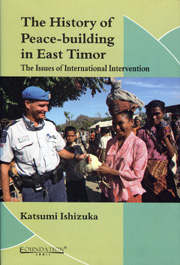Book contents
- Frontmatter
- Contents
- Preface
- Acknowledgements
- Acronyms
- Introduction
- Section 1 Historical Background
- Section 2 Policy Analysis
- Chapter III Review of the United Nations Transitional Administration in East Timor (UNTAET)
- Chapter IV UNMISET and Capacity-building in East Timor
- Chapter V A Judicial Aspect in Peace-building in East Timor: Response to Crimes against Humanity in 1999
- Chapter VI After the 2006 Crisis in East Timor: the Issue of the Exit Strategy and Capacity-building in UN Peace Operations
- Chapter VII Australia's Response to East Timor's Issues
- Section 3 Comparative Analysis
- Conclusion
- Bibliography
- Index
Chapter IV - UNMISET and Capacity-building in East Timor
from Section 2 - Policy Analysis
Published online by Cambridge University Press: 26 October 2011
- Frontmatter
- Contents
- Preface
- Acknowledgements
- Acronyms
- Introduction
- Section 1 Historical Background
- Section 2 Policy Analysis
- Chapter III Review of the United Nations Transitional Administration in East Timor (UNTAET)
- Chapter IV UNMISET and Capacity-building in East Timor
- Chapter V A Judicial Aspect in Peace-building in East Timor: Response to Crimes against Humanity in 1999
- Chapter VI After the 2006 Crisis in East Timor: the Issue of the Exit Strategy and Capacity-building in UN Peace Operations
- Chapter VII Australia's Response to East Timor's Issues
- Section 3 Comparative Analysis
- Conclusion
- Bibliography
- Index
Summary
Introduction
This chapter will deal with the United Nations Mission of Support in East Timor (UNMISET). As stated in the previous chapter, UNTAET virtually formed ‘an interim government’ until East Timor officially became independent. In April 2002, a presidential election was conducted in East Timor and the independence leader Xanana Gusmao captured 82.7 per cent of the vote. East Timor officially became independent on 20 May 2002 when the mandate of UNTAET as ‘transitional administration’ was implemented. However, this nascent state needed the continuing presence of a UN operation. Security was still fragile. A lot of East Timorese refugees still remained in West Timor. Defence and police forces required external training. The social structure in East Timor was still unstable. Above all, East Timor still required international assistance to build its capacity as an independent state. Therefore, UN, Security Council Resolution 1410 (2002) of 17 May 2002 was adopted by the Security Council, and UNMISET was established to replace UNTAET.
UNMISET had three elements in its mandate: (a) to provide assistance to core administrative structures critical to the viability and political stability of East Timor (b) to provide interim law enforcement and public security and to assist in the development of a new law enforcement agency in East Timor, the East Timor Police Service; and (c) to contribute to the maintenance of the external and internal security of East Timor.
- Type
- Chapter
- Information
- The History of Peace-Building in East TimorThe Issues of International Intervention, pp. 95 - 122Publisher: Foundation BooksPrint publication year: 2010

